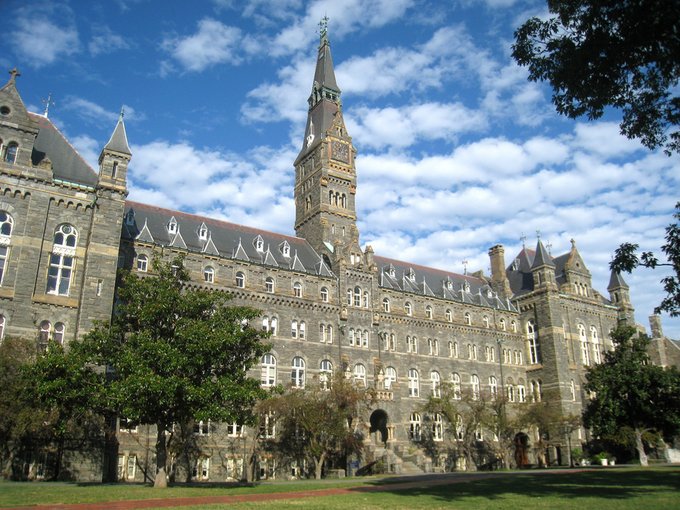
At Georgetown University on Thursday, President Jack DeGioia will offer an apology for the university's historical relationship with slavery. (Flickr)
Georgetown University will offer an edge in admissions to the descendants of slaves sold in the 1800s to keep the university financially afloat.
The Catholic university announced Thursday that it is taking several steps to recognize and memorialize the Catholic university’s past, including the creation of a center for the study of slavery, the renaming of two buildings and the construction of a memorial to the 272 slaves who worked on Jesuit plantations in southern Maryland before they were sold in 1838 to pay off the university's debt.
In a statement, Georgetown President Jack DeGioia said the university will engage directly with descendants of slaves on campus and where they live, soliciting feedback and determining priorities.
“I am grateful to the many members of our community who have thoughtfully and respectfully contributed their perspectives and shared their insights,” DeGioia wrote in the university’s report called "Slavery, Memory and Reconciliation."
Over the past ten years, several colleges and universities, including Brown, Harvard and Yale, have made efforts to recognize their ties to slavery and the slave trade, but it appears Georgetown is the first to give a deferential advantage to the descendants of slaves.
On Thursday afternoon, speaking on campus, offered a public apology for the university's relationship with slavery.
Earlier: How Should Colleges Acknowledge And Memorialize Their Ties To Slavery?
"It is my hope that such a step can begin a journey of reconciliation," DeGioia said.
MIT historian Craig Steven, author of Ebony and Ivy: Race, Slavery and the Troubled History of America’s Universities, calls Georgetown’s commitment very thoughtful, and he says the university appears to be going further than any of its peers in addressing the relationship between the university and its slave past.
“The difference between Georgetown and most of its peer institutions is that the Jesuits actually kept records of their financial dealings, which includes info about the people who were enslaved in Maryland and supported the Jesuit institutions," Wilder said.
While institutions like Columbia, Yale, Princeton and Harvard all have deep connections to the slave trade, Wilder points out, the historical record of those connections is relatively weak.
“It’s very hard to bring those down to individual people about whom one can create a real biography,” he said.
Wilder says Georgetown giving slave descendants the same edge that it gives to legacy admissions, effectively placing them in the “Georgetown family,” is symbolically important, but he thinks historians and students activists should be careful about celebrating the university too early because slave records are notoriously thin.
"That’s one of those promises that will take years, decades, generations to have real meaning," Wilder said. "It’s going to depend heavily on the ways in which the current administration chooses to institutionalize that commitment over time."
As WGBH's On Campus reported in May, American higher education's recognition to its past can be complicated.
"It’s very easy to start this kind of thing. It’s very difficult to quit,” Emerson College professor Ted Gup said. "Most institutions are so stained by history that once you start revisiting it, everything will fall. If you’re going to go into the historical record and really address it, then let’s bring it all forward and examine it."
Related: Harvard President Calls On Institution To Recognize Ties To Slavery










